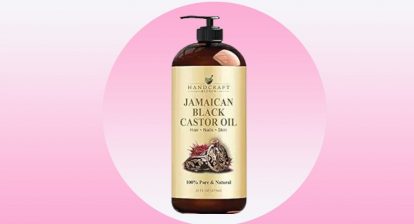Castor oil is a trendy natural remedy with ancient roots. The oil has been used by people around the world for a variety of purposes for thousands of years. Recently, thanks to social media’s wellness craze, the benefits of castor oil have been in the spotlight.
On TikTok, there are countless videos of people claiming castor oil can allegedly aid digestion to rapidly grow hair and improve vision. Proponents swear by putting castor oil on their scalp, face, in their bellybutton and even into their eyes.
As with many health trends on social media, some of the uses and claims about castor oil have ignited concern among doctors and warnings from ophthalmologists.
Is there any science to back up these popular claims and what, if any, are the health benefits of castor oil? Here’s what experts say.
What is castor oil?
Castor oil is a type of vegetable oil derived from the seeds of the castor bean plant (ricinus communis), which is naturally found in parts of Africa, India and South America, Dr. Joshua Zeichner, a dermatologist at The Mount Sinai Hospital, tells TODAY.com.
The thick, pungent oil has been used for centuries to treat various health conditions, for cosmetic purposes and in industrial applications. It was a popular remedy in ancient Egypt and has been utilized in Ayurveda, Unani, and traditional Chinese medicine, according to an article published in the journal Toxins.
Today, castor oil is an ingredient in cosmetics, skincare and household products. You can find it sold over-the-counter at most pharmacies, grocery stores, and online retailers.
Types of castor oil
Castor oil is typically extracted by cold-pressing the castor seeds, says Zeichner. Castor oil may be sold in various forms including organic, refined or unrefined, which all have to do with how the plant was grown or how the seeds were processed.
The type of castor oil typically sold over the counter is made from cold-pressed castor seeds. It’s a pale yellow color, has a sticky consistency, and a distinct odor and taste, the experts note.
In addition to cold-pressed castor oil, you may find another type of castor oil on shelves called black castor oil or Jamaican black castor oil. According to many labels, this type of castor oil is extracted from castor bean seeds that were roasted first.
Some types of castor oil are marketed for use on the hair or skin, while others are labeled as food-grade or USP-grade. Always speak with a doctor or pharmacist if you have questions.
Does castor oil have benefits?
Castor oil has natural anti-inflammatory and antioxidant properties that may offer some health benefits when taken orally or applied topically.
A major component of castor oil is ricinoleic acid, an omega-9 fatty acid that has natural emollient benefits, which is thought to help hydrate or smooth the skin, says Zeichner.
While castor oil does contain many nutrients that may be beneficial for health, the U.S. Food and Drug Administration only approves castor oil for one use: as a stimulant laxative, per the National Institutes of Health. Castor oil is probably best known as a natural treatment for occasional constipation, the experts note.
There are an abundance of historical and anecdotal reports about castor oil’s other benefits, but the scientific evidence to back these up is often lacking, according to experts.
What is a castor oil pack?
A castor oil pack is a compress or cloth which is soaked in castor oil and applied to a part of the body, often the abdomen, Samantha Cassetty, a registered dietitian nutritionist, tells TODAY.com.
It’s another way to apply castor oil topically, but the idea is that leaving an oil-soaked cloth on the skin for a prolonged period of time allows much more oil to be absorbed.
Castor oil packs may be worn for anywhere from an hour to overnight. Some people apply a heating pad or hot water bottle on top of the pack as well, says Cassetty.
Many proponents believe that the oil absorbed from the pack can penetrate deep beyond the skin into the body, where it can affect the internal organs.
On social media, proponents claim that applying castor oil packs can help with gastrointestinal problems, cramping, detoxing the liver, and breaking down cysts or tumors.
There’s no scientific evidence that applying a castor oil pack to the skin can do any of these things, the experts warn. In order to reap castor oil’s benefits for constipation, it needs to be ingested — and when it comes to toxins, the body already has a built-in detoxifier: the liver.
While the warmth from the castor oil pack and an additional heat source may be soothing for cramps, the experts warn that prolonged application of castor oil on the skin may cause irritation.
Even though castor oil is all natural, it can cause an allergic skin reaction called contact dermatitis, which is a rash that occurs when a substance touches the skin, TODAY.com previously reported.
People who are concerned about an allergic reaction can perform a patch test before using a castor oil pack. This involves applying a small amount of castor oil on the arm and waiting 24 hours to monitor for any signs of a reaction.
Castor oil for digestion
Castor oil can be taken orally as an over-the-counter stimulant laxative to relieve occasional constipation, Dr. Adil Bharucha, a gastroenterologist at the Mayo Clinic, tells TODAY.com.
It is safe to consume when taken in the proper dosage, as directed by a doctor and on a short-term basis, Bharucha adds.
However, there are a number of downsides and some risks involved with using castor oil for constipation.
“A stimulant laxative stimulates the muscles in your intestine to push stool out, so it’s kind of an aggressive type of laxative,” says Cassetty. It often induces abdominal cramping and an intense bout of diarrhea, which may be accompanied by nausea.
Compared to other safe and effective over-the-counter stimulant laxatives, castor oil has more side effects, the experts warn. “Castor oil, especially in larger quantities, is associated with more cramping, vomiting, bloating and dizziness,” says Cassetty.
Castor oil is also notorious for having an unpleasant taste, says Bharucha, as well as a nauseating aftertaste that can linger in the mouth.
While castor oil may be safe to use for occasional constipation, it’s not recommended for routine use, the experts note.
In the long-term, taking a stimulant laxative too frequently can affect the muscles of the intestines and colon, making it harder to pass bowel movements on your own, says Cassetty. Regular use of castor oil can also be harsh on the gut, Bharucha notes. Over time, it may even damage the inner lining of the intestinal tract.
“Use on an as-needed basis, intermittently and (in) the right dose, is probably not harmful, but it’s not something that I recommend,” says Bharucha. There are plenty of better-tasting alternatives.
Castor oil for hair
Castor oil is commonly used as a natural hair treatment. Long before it became trendy on TikTok, people were applying castor oil to promote hair growth, the experts note. Today, castor oil is found in many conditioners and hair products.
Proponents claim that applying castor oil to the scalp can stimulate the hair follicles and help hair grow faster, longer, and thicker.
However, there is no scientific evidence that applying castor oil to the scalp or hair directly promotes hair growth, Dr. Shari Lipner, a dermatologist at Weill Cornell Medicine, tells TODAY.com.
Castor oil’s emollient properties may help moisturize and hydrate strands, says Zeichner, which could help hair look thicker after applying. However, castor oil’s hair-thickening properties have not been studied, the experts note.
It’s generally safe to apply castor oil to the hair and scalp, the experts note. Potential side effects include clogged pores and irritation, says Lipner. Over time, the thick, sticky oil may also build up and cause the hair to appear greasy.
Castor oil for eyebrows and eye lashes
“Castor oil is commonly used as a natural treatment for eyelash and eyebrow growth,” says Zeichner. Proponents on social media are often seen applying the oil directly to their lashes and brows. Castor oil can also be found in eyelash conditioners and serums.
The moisturizing properties are thought to help condition or thicken the tiny hairs, Zeichner explains. “It’s a similar situation to applying castor oil the scalp for hair growth,” says Lipner.
While there are many anecdotal reports suggesting castor oil can boost eyelash or brow growth, the research to support these claims is slim, the experts note.
In a report, the Tear Film & Ocular Surface Society concluded “there is no research indicating that eyelash cilia or follicles are either positively or negatively impacted by topical application (of castor oil) to the eyelash line.”
These applications of castor oil could also irritate the sensitive skin around the eyes and brows, Lipner adds.
Some proponents on TikTok are claiming castor oil can improve blurred vision, fix dry eye, or treat eye diseases.
“There is zero scientific evidence that castor oil can safely and effectively treat glaucoma, cataract and other serious eye problems as proclaimed in some social media posts,” Dr. Christopher Starr, a clinical spokesperson for the American Academy of Ophthalmology, tells TODAY.com.
While the evidence supporting castor oil for eye health is slim, there are known risks of putting the oil into the eyes. These include irritation, burning, pain, redness, blurred vision and damage to the surface of the eye, says Starr.
If you have issues with your eyes or vision, visit an eye doctor.
Castor oil for skin
Castor oil is increasingly popular as a natural skin remedy and it’s an ingredient some skin care products, per the Cleveland Clinic. Proponents claim applying castor oil to the face boosts moisture, reduces wrinkles, combats puffiness, and clears up breakouts.
According to Zeichner, the fatty acids in ricinoleic acid may help smooth, soften and hydrate the skin, and castor oil’s antioxidants properties could in theory protect the skin from free radical damage. However, castor oil’s skin health benefits have not been studied extensively, says Lipner.
If people choose to use castor oil on the skin, Zeichner recommends diluting it with a carrier oil (such as coconut oil) and applying a small amount once a day or as needed. “Applying straight castor oil may lead to skin irritation, inflammation and dryness,” Zeichner adds.
Other risks of using castor oil on the face include clogged pores and new or worsened acne, says Lipner.
Castor oil for moles and skin tags
On social media, some claim castor oil can help remove moles and skin tags. There is no scientific evidence castor oil can reduce or remove any skin growths, the experts note.
“Even if it did, I don’t think it would be a safe way to remove these things at all,” says Lipner. Skin tags and moles should be removed by a professional, the experts emphasize.
Castor oil in belly button
Another trend on social media is applying castor oil in the belly button. Some claim can this can help reduce overall inflammation, improve gut health, and even stimulate fat loss from the abdomen.
Does applying castor oil in the belly button have any of these benefits? The answer is a resounding no, according to the experts — there isn’t scientific evidence to back up any of these claims.
Side effects of castor oil
The side effects of castor oil taken by mouth include:
- Diarrhea
- Abdominal cramps
- Nausea
- Vomiting
- Irritation
- Damage to intestinal tract
The side effects of castor oil applied to the skin:
- Irritation
- Rash
- Clogged pores
- Acne
The side effects of castor oil applied in the eyes include:
- Infection
- Irritation
- Redness
- Blurry vision
How much castor oil to take
When taken orally, the dosage of castor oil will vary depending on the person’s age and size.
According to the Food and Agriculture Organization and the World Health Organization, the acceptable daily intake of castor oil (for adult males) is up to 0.7 milligrams per kilogram body weight, says Bharucha.
However, it’s best to leave it up to your doctor to calculate the appropriate dosage and regimen.
Precautions for using castor oil
Always consult your health care provider before using castor oil as a stimulant laxative. When using castor oil on the skin, stop if you notice any irritation or rash developing, the experts note.
Avoid putting castor oil directly into the eyes, no matter what you see on social media, the experts warn. Some FDA-approved eye drops contain castor oil, but the castor oil you buy in stores is not safe for use directly in the eyes, Starr says.
As with any trend online, don’t always believe what you see or hear, and talk to your doctor if you have questions.





